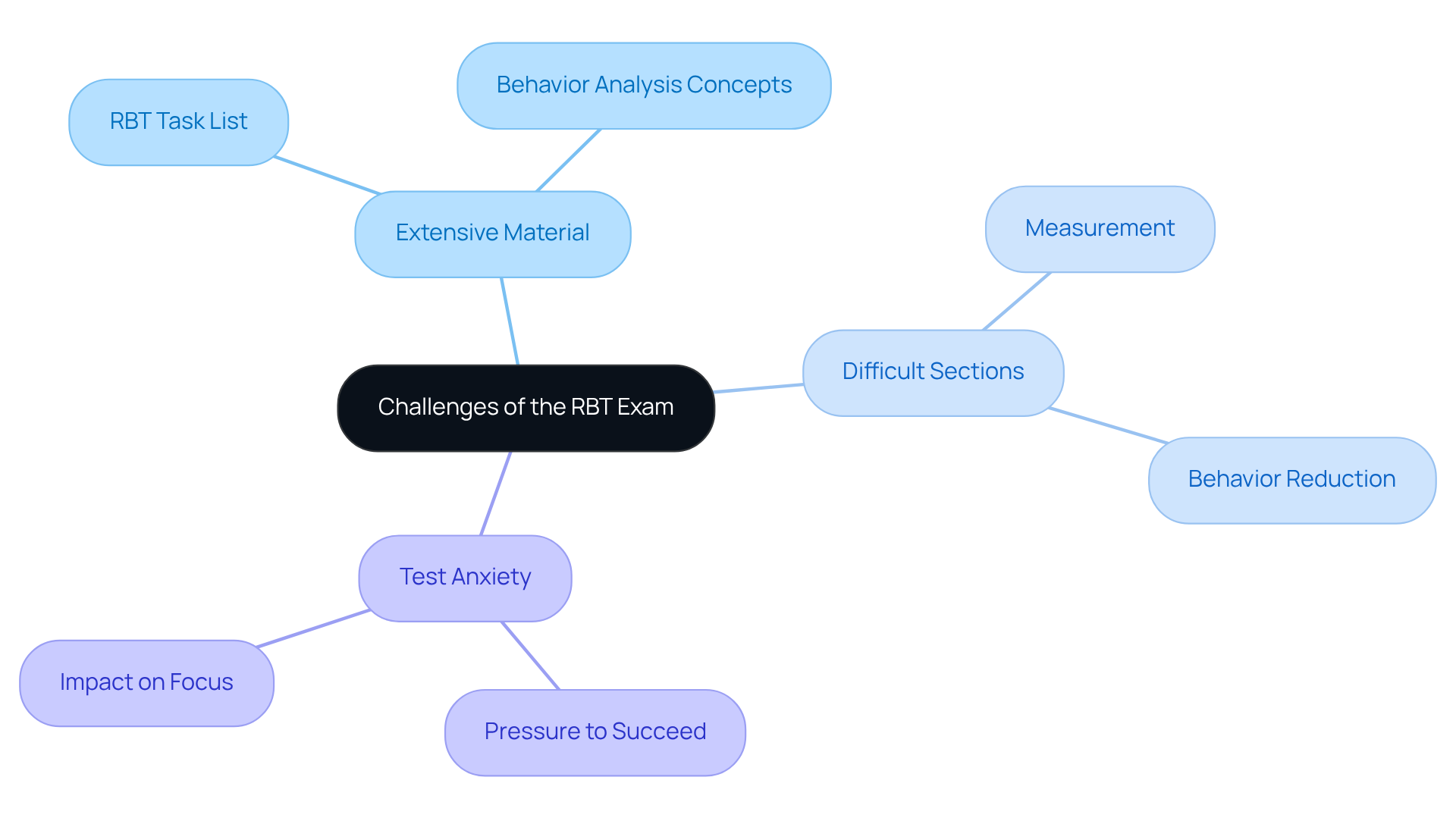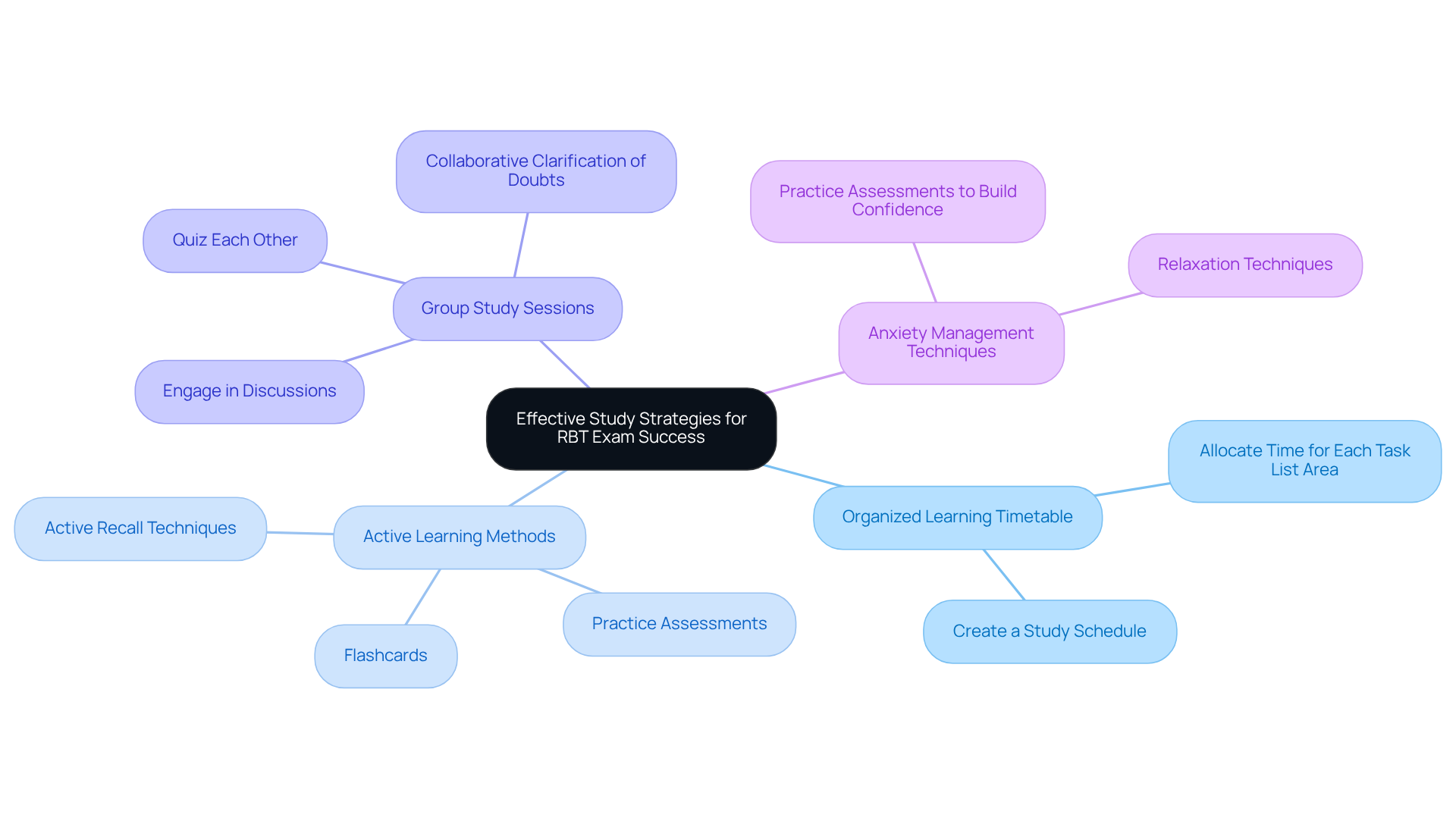August 28, 2025

The RBT exam poses significant challenges, largely due to its extensive content and the psychological pressures candidates encounter. This necessitates thorough preparation across various domains of applied behavior analysis. Notably, the comprehensive material outlined in the RBT Task List, coupled with a minimum passing score and fluctuating average pass rates, underscores the myriad difficulties candidates face. This reality emphasizes the critical importance of effective study strategies and the management of test anxiety.
Are you prepared to tackle these challenges head-on? Consider implementing robust study techniques to enhance your chances of success.
The RBT exam presents a formidable challenge, its intricate structure and demanding content often leaving candidates questioning their readiness. With 85 multiple-choice questions assessing knowledge across critical areas of applied behavior analysis, this exam tests not only theoretical understanding but also practical application under time constraints. As pass rates hover between 70% and 80%, the stakes are undeniably high. This prompts aspiring RBTs to reflect: what truly makes this exam so difficult, and how can one effectively navigate its complexities to ensure success?
The RBT assessment comprises 85 multiple-choice questions, including 75 scored items and 10 unscored pilot questions. Candidates are allocated 90 minutes to complete this assessment, which evaluates knowledge across six essential areas:
The assessment material is grounded in the RBT Task List, requiring individuals to demonstrate a comprehensive understanding of applied behavior analysis principles.
The comprehensive nature of the task list, along with strict time constraints, makes many wonder if the RBT exam is hard, emphasizing the need for extensive preparation and a solid understanding of the material. To pass the RBT assessment, individuals must achieve a . Historically, the average pass rate for first-time applicants has fluctuated between 70% and 80%. However, recent trends indicate a decline in these rates, which raises the question of whether the RBT exam is hard, underscoring the importance of thorough preparation.
As Fayge Orzel observes, 'To enhance your chances of succeeding in the RBT test on your first attempt, prioritize comprehensive preparation.' This statement emphasizes the need for applicants to understand the test format and types of inquiries, as well as to engage in effective learning techniques. Furthermore, case studies have shown that individuals who utilize varied study methods and practice assessments are more likely to succeed, emphasizing the question of whether the RBT exam is hard for those preparing for the RBT assessment.

One question candidates preparing for the RBT assessment often have is [whether the RBT exam is hard](https://levelaheadaba.com/blog/rbt-exam-difficult), as they face several significant challenges. A primary hurdle is the extensive material outlined in the RBT Task List, which raises the question of whether the RBT exam is hard, as it necessitates a thorough grasp of various behavior analysis concepts. Among the most difficult sections, Measurement and Behavior Reduction stand out, leading many to wonder if the RBT exam is hard due to their intricate nature and the requirement for precise application of ABA principles. As noted, "These sections require an understanding of data collection, behavior analysis, and the application of ABA principles."
Furthermore, test anxiety significantly affects performance; many individuals express that the pressure to succeed, particularly on their first attempt, can detrimentally impact their focus and decision-making, raising the question of whether the RBT exam is hard. In 2023, the initial pass rate for the RBT assessment was 74%. This statistic suggests that while many individuals succeed, a considerable number require . The interaction of thorough material and psychological pressure leads many aspiring RBTs to question if the RBT exam is hard. This highlights the necessity for effective preparation methods, such as organized learning schedules and practice assessments.

Many candidates wonder, is the RBT exam hard, and to excel in it, they must implement a comprehensive preparation strategy. An organized learning timetable that allocates time to each fundamental aspect of the RBT Task List is essential, as it delineates the competencies and skills required for success. This approach not only structures learning efforts but also ensures that all critical topics are systematically addressed.
By integrating active learning methods, such as flashcards and practice assessments, candidates can enhance their understanding and retention of key concepts. Group study sessions can further amplify this effect, providing opportunities for candidates to engage in discussions, quiz one another, and collaboratively clarify doubts.
Additionally, managing test anxiety through relaxation techniques and practice assessments can significantly bolster confidence levels. Notably, the ranges from 70% to 80%, leading many to wonder if the question is the RBT exam hard, which underscores the importance of thorough preparation.
By employing these strategies, individuals can deepen their comprehension of the material and markedly improve their test performance. As Pelé wisely stated, "Success is no accident. It is hard work, perseverance, learning, studying, sacrifice and most of all, love of what you are doing or learning to do.

The question of whether the RBT exam is hard carries substantial implications for career advancement within the field of Applied Behavior Analysis. Successfully passing this assessment, which mandates a minimum score of 200 out of 250 points and typically has a national average pass rate below 80%, validates an individual's knowledge and skills, thereby opening doors to diverse employment opportunities in schools, clinics, and private practices.
Notably, many employers prefer or require RBT certification. In fact, 87% of ABA service organizations report challenges in filling RBT positions, highlighting the critical nature of this certification for those aspiring to establish a career in ABA therapy. Furthermore, the RBT certification serves as a pivotal stepping stone for further professional development, such as pursuing Board Certified Behavior Analyst (BCBA) status.
While the exam may present challenges, many wonder if the RBT exam is hard; however, the rewards of certification can significantly enhance a candidate's career trajectory. Additionally, 76% of certified RBTs express satisfaction with their career choice, underscoring the rewarding nature of this profession.
The ranges from $140 to $655, reflecting its perceived value in a job market projected to grow by 22% through 2031. Completing a 40-hour training program is also a critical step in the certification process, emphasizing the commitment required to thrive in this field.

The RBT exam poses a significant challenge for many candidates, encompassing a broad spectrum of complex topics within applied behavior analysis. This examination not only assesses knowledge across critical areas but also imposes time constraints that can exacerbate the difficulties encountered. A thorough understanding of the comprehensive nature of the RBT Task List and the necessity for meticulous preparation is essential for prospective RBTs aiming for success.
Key challenges highlighted throughout this discussion include:
Candidates are urged to adopt effective study strategies, including:
These strategies can bolster their chances of passing the exam. The statistics regarding pass rates further emphasize the importance of diligent preparation, as many candidates find themselves requiring multiple attempts to secure certification.
While the RBT exam presents various challenges, it simultaneously serves as a crucial gateway to numerous career opportunities within the field of Applied Behavior Analysis. The certification not only validates an individual’s skills but also plays a vital role in career advancement and job satisfaction. For those aspiring to become RBTs, embracing effective study methods and recognizing the exam's significance can pave the way for a rewarding career path, making the effort invested in preparation truly worthwhile.
What is the structure of the RBT exam?
The RBT exam consists of 85 multiple-choice questions, including 75 scored items and 10 unscored pilot questions. Candidates have 90 minutes to complete the assessment.
What areas does the RBT exam evaluate?
The RBT exam evaluates knowledge across six essential areas: Measurement, Assessment, Skill Acquisition, Behavior Reduction, Documentation and Reporting, and Professional Conduct.
What is the passing score for the RBT assessment?
To pass the RBT assessment, individuals must achieve a minimum score of 200 out of 250.
What has been the average pass rate for first-time RBT applicants?
Historically, the average pass rate for first-time RBT applicants has fluctuated between 70% and 80%, though recent trends indicate a decline in these rates.
Is the RBT exam considered difficult?
Many candidates wonder if the RBT exam is hard, and the comprehensive nature of the task list along with strict time constraints suggests that extensive preparation and a solid understanding of the material are crucial for success.
What preparation strategies are recommended for the RBT exam?
To enhance chances of success, candidates are advised to prioritize comprehensive preparation, understand the test format and types of questions, and engage in effective learning techniques, including varied study methods and practice assessments.
Our expert recruitment strategies and AI-driven sourcing ensure that you receive top-notch candidates quickly, without compromising on quality. Whether you’re looking for BCBAs, Clinical Directors, or RBTs, we’ve got you covered.